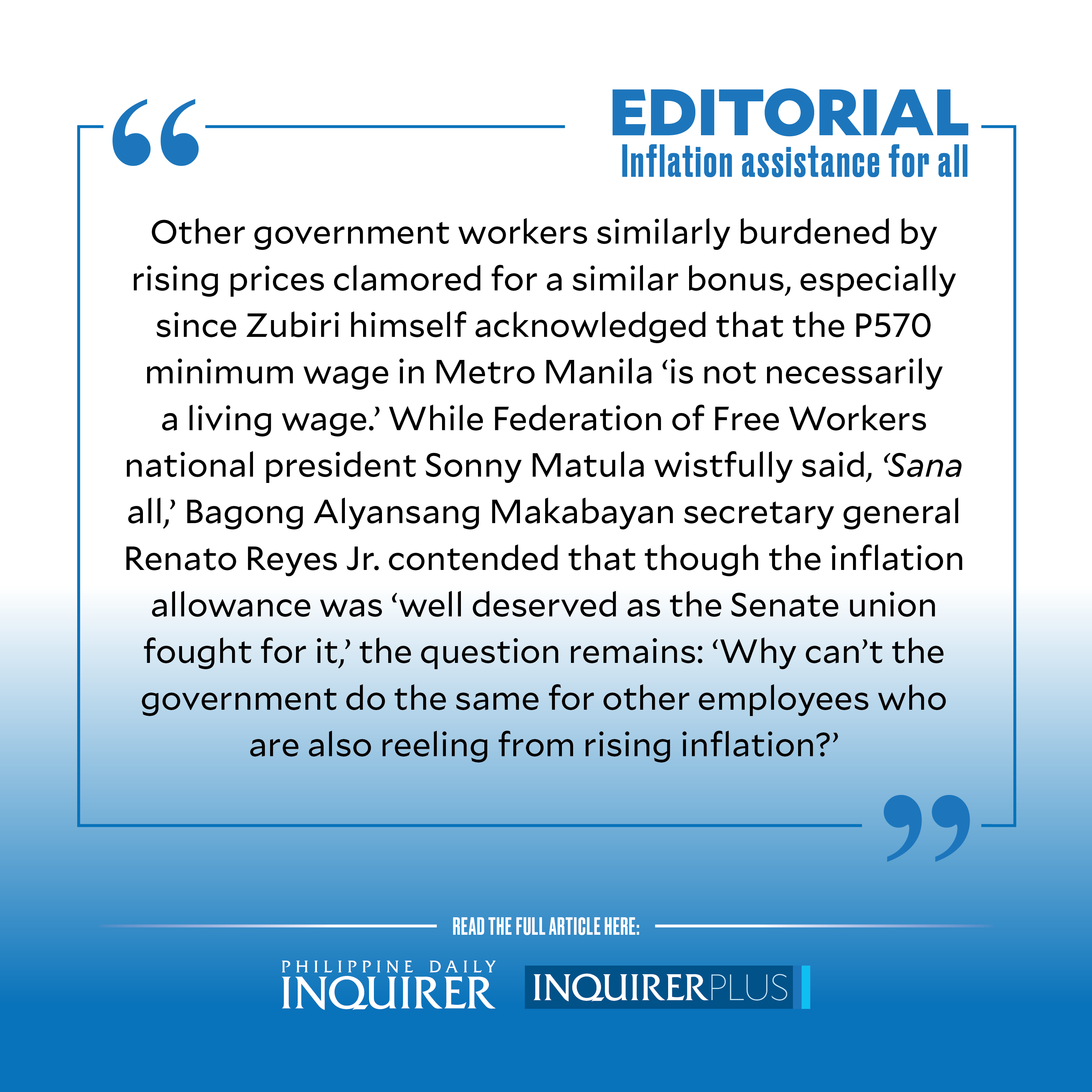Inflation assistance for all

Filipinos struggling to cope with relentlessly rising prices can only look with envy and mounting frustration as Senate President Juan Miguel Zubiri recently announced that all 3,000 Senate personnel will receive by August this year a 317-percent increase in their one-time “inflation assistance.” This would amount to at least P50,000, with another P50,000 medical assistance promised in September. “With the increase in inflation, the inflation assistance should go up as well,” Zubiri said during the Senate’s flag raising ceremony on Feb. 20.
The sense of entitlement over scarce public funds is bad enough, but to flaunt such a generous bonus at this time, when everyone else is in dire straits, is the height of insensitivity. The Senate leadership cannot now complain about the flak it is getting.
Other government workers similarly burdened by rising prices clamored for a similar bonus, especially since Zubiri himself acknowledged that the P570 minimum wage in Metro Manila “is not necessarily a living wage.” While Federation of Free Workers national president Sonny Matula wistfully said, “Sana all,” Bagong Alyansang Makabayan secretary general Renato Reyes Jr. contended that though the inflation allowance was “well deserved as the Senate union fought for it,” the question remains: “Why can’t the government do the same for other employees who are also reeling from rising inflation?”
It’s a view shared by other groups who have renewed their call for an increase in basic wage as all Filipinos’ purchasing power has steadily been eroded by record-high fuel prices, following Russia’s invasion of Ukraine in February last year. Couple this war with the lingering effects on the global supply chain because of the COVID-19 pandemic, the impact of recent typhoons on agriculture, the weakening of the peso against the US dollar, and the shortage of household staples from onions to sugar and eggs, and the negative effect on the prices of local and imported goods and services becomes inevitable. Already, inflation has surged past the government’s and private analysts’ projections to a 14-year high of 8.7 percent in January. The impact is more severe on the bottom 30 percent of the country’s households, which suffered a higher inflation rate of 9.7 percent.
The unabated increase in the inflation rate has debunked Finance Secretary Benjamin Diokno’s theory last December that the “worst is over,” and that prices should start cooling down this year. Instead of decelerating, inflation is picking up pace, with the Bangko Sentral ng Pilipinas (BSP) expecting the February number to hit as high as 9.3 percent on more expensive cooking gas, and the still high prices of key food items such as pork and fish. Worse, there is no assurance that this is the long-awaited peak, after which price pressures should ease up to the government target range of between 2 and 4 percent.
Indeed, BSP Governor Felipe Medalla seems resigned to the possibility that the fight against persistently high inflation will drag on until next year—which means that BSP may again raise its key policy rate from the current 6 percent. Higher rates will, in turn, lead to higher borrowing costs for a new house, car, or business for both individuals and corporations that could ultimately lead to a slower economic growth, which the Philippines can ill-afford, having just started to recover from the devastation wrought by the pandemic.
Given this gloomy scenario, the Marcos Jr. administration should be true to its word and roll out the promised support for Filipinos grappling with the rising cost of living, and not just the lucky employees of the Senate. Such support include the P3-billion fuel subsidy program aimed at cushioning the impact of high oil prices on public utility vehicle drivers, and the P9.3-billion “ayuda” under the targeted cash transfer program meant to provide a two-month subsidy or P1,000 each to some 9.3 million of the country’s “poorest of the poor.” It should also give serious thought to the proposal of Marikina Rep. Stella Quimbo to use the additional tax collections from more expensive imports—estimated at P30.4 billion a year for every percentage point increase in inflation—to help consumers, including the middle class, cope with inflation. Consider as well the suggestion of the Trade Union Congress of the Philippines to provide an emergency cost of living allowance to wage earners.
As the Marcos Jr. administration pores over these proposals and answers the clamor for immediate relief, it should also devote equal effort to addressing the underlying causes of skyrocketing prices of basic commodities—such as the fractured and underfunded agriculture sector—to come up with more permanent and sustainable solutions to inflation that spares no one.
















